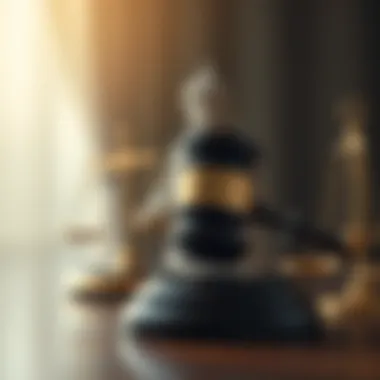Exploring the Court System in Dubai: Structure and Process


Intro
Navigating the court system in Dubai can feel like walking through a labyrinth, especially for those unfamiliar with its structure and processes. The emirate's judicial framework is not just a reflection of its legal standards, but also an embodiment of its cultural and economic nuances. Understanding how it operates is crucial—whether you're a resident needing to resolve a personal matter, an investor looking to safeguard assets, or a professional engaged in legal practices. This guide aims to demystify the judicial landscape of Dubai, offering insights that will enable you to approach legal proceedings with keen awareness and preparedness.
As we dive deeper into the essence of Dubai's court system, we will explore its various components, from the hierarchy of courts to the specific legal procedures that shape outcomes. The objective remains clear: to provide a roadmap through which individuals can not only comprehend but also effectively navigate the intricacies of the system.
In the following sections, we will elaborate on the market trends that exert influence on the legal landscape, spotlight the differing court types and their jurisdictions, and unravel key legal procedures—ultimately aiming for a comprehensive understanding of the judiciary in Dubai.
Overview of the Judicial System in Dubai
Understanding the judicial system in Dubai is essential, not just for legal professionals, but for anyone interacting with the city’s vibrant economy and diverse population. Dubai’s court system embodies both traditional influences and modern innovations, reflecting its rapid development while maintaining its rich cultural heritage. Knowing how this system operates can significantly benefit investors, home buyers, and anyone involved in real estate transactions.
Historical Context
Dubai's legal framework has evolved significantly over the years, rooted in a blend of customary practices and formal regulations. Historically, the legal landscape was heavily influenced by Bedouin customs and tribal law. As trade flourished, particularly in the late 19th and early 20th centuries, there was a growing need for a structured judicial system to resolve disputes and uphold trade agreements.
In 1971, with the formation of the United Arab Emirates, Dubai's approach to justice began to formalize. The first judicial department was established, and decisive steps were taken to create a coherent legal framework. Over the decades, consistent efforts have been made to modernize the judiciary, balancing traditional values with the demands of a contemporary urban society. The system has shifted from being solely based on Sharia law to incorporating civil law principles, which is particularly important for expatriates and foreign investors engaging in the market.
Modern Judicial Framework
Today, the judicial framework in Dubai is a multi-tiered system designed to handle a diverse range of cases efficiently. The system is composed of various courts, including the Court of First Instance, the Court of Appeal, and the Supreme Court, as well as specialized courts for areas such as family law and commercial disputes. Each of these courts serves a vital role, ensuring that justice is not only served but also accessible to all.
The Court of First Instance is where most cases commence and plays a crucial role in adjudicating both civil and criminal matters. If a party is dissatisfied with the ruling, they may appeal to the Court of Appeal, which revisits the case with fresh eyes. The Supreme Court stands as the ultimate authority, ensuring that the application of the law remains consistent across various matters.
In addition to regular courts, specialized courts have emerged to address specific needs more effectively. For instance, the Commercial Courts focus on business-related matters, facilitating quicker resolutions to disputes that could impact the economy. Family Courts provide sensitive handling of family matters, understanding the nuances and emotional complexities involved.
"The ongoing evolution of Dubai's judicial system not only reflects its rapid urbanization but also a commitment to providing a fair and equitable framework that caters to its multicultural population."
Types of Courts in Dubai
The classification of courts in Dubai plays a crucial role in its judicial system, shaping how justice is administered. Each court is designed to address specific types of cases, ensuring that the judiciary operates efficiently. Understanding these types helps individuals and businesses navigate the legal landscape effectively. Below are the key courts within Dubai's judicial system.
Court of First Instance
The Court of First Instance serves as the entry point for most civil matters and criminal cases in Dubai. It is essentially where cases begin. This court handles a wide array of disputes, from business transactions to personal grievances. Notably, the judges are empowered to make initial rulings which can significantly influence the course of a case.
Individuals seeking legal recourse often find themselves at this court, as it has the broadest jurisdiction. Additionally, the procedures here are designed to be accessible, allowing parties to present their cases effectively.
Court of Appeal
Once a decision is made at the Court of First Instance, it's possible for parties to seek a second opinion at the Court of Appeal. This court is critical in ensuring that the judicial decisions are fair and just, providing a checking mechanism. The judges review both the application of the law and the facts of the case.
The appeal process allows for deeper scrutiny, which is vital in complex cases where the stakes are high. While this court operates under strict procedural rules, its role is indispensable in addressing errors that may result from the previous rulings.
Supreme Court
The Supreme Court represents the highest level of judicial authority in Dubai. It deals with appeals from the lower courts, ensuring that interpretations of law maintain consistency across the judicial system. This court is not only a forum for correcting lower court errors, but also a guardian of legal principles, affecting legislation in significant ways.
Cases reviewed here often draw considerable attention, particularly those involving landmark legal issues which can set important precedents for future cases.
Specialized Courts
Specialized Courts address specific types of legal matters, catering to distinctive needs within the legal fabric of Dubai. These courts are tailored to ensure that experts oversee cases relevant to their fields. They encompass several branches:
Commercial Courts
Commercial Courts focus exclusively on business-related cases, such as contract disputes and trade issues. Their concentrated expertise allows for faster and more astute resolutions. One standout feature is that these courts often employ judges with backgrounds in commerce and trade, ensuring informed decisions. Better insights into the complexities of commercial law make these courts a preferred choice for businesses seeking swift relief.
Family Courts
Family Courts primarily handle matters involving divorce, custody, and alimony. The sensitive nature of family law necessitates a specialized approach, as emotional complexities often influence case outcomes. This court aims for resolution through mediation and careful deliberations rather than merely punitive measures. Families benefit from this bespoke approach, which often leads to more amicable settlements.


Criminal Courts
Criminal Courts address offenses ranging from misdemeanors to felonies. The judiciary here plays a vital role in upholding law and order, ensuring that justice is served fairly. An important characteristic is that criminal cases often come with serious implications, including potential imprisonment. Thus, the court must balance the enforcement of law with the rights of defendants, making it a critical part of the judicial process.
Administrative Courts
Administrative Courts oversee disputes between individuals and governmental entities. Cases here may involve public service issues and administrative actions. The focus is on whether regulations have been applied justly, which ensures accountability within the public sector. This court helps in clarifying the rights of citizens against the backdrop of bureaucracy, helping to maintain a transparent governance framework.
Understanding the types of courts and their specific roles in the Dubai judicial system provides a clearer picture of how legal processes unfold. Knowing which court to approach for particular kinds of disputes can save individuals and businesses time and resources, making it an essential aspect of engaging with the legal landscape in Dubai.
Jurisdiction of Dubai Courts
Understanding the jurisdiction of the Dubai courts is crucial for anyone looking to navigate the legal landscape here. Jurisdiction essentially defines the scope of authority the courts have over various types of cases, which impacts both the individuals and businesses operating within this vibrant city. Knowing the jurisdiction allows parties to determine the right court for their issues, making it a central point of concern whether you're an investor or a resident.
In Dubai, the courts adhere to distinct categories of jurisdiction that help in the orderly handling of different legal matters. The court system is designed to provide clear-cut guidelines depending on the nature of the case. This clarity benefits not just the court but individuals and entities alike. Ultimately, a well-defined jurisdiction assures that disputes are managed with the proper legal context, facilitating timely resolutions and minimizing unnecessary delays.
Civil Jurisdiction
Dubai’s civil jurisdiction covers disputes related to contracts, property, and obligations. It deals with cases where one party claims damages or specific performance from another. In daily life, think of it like a landlord seeking overdue rent or a contractor suing a client for breach of contract. Civil cases are common and often involve significant sums of money, making legal recourse essential for maintaining trust in business affairs.
The courts provide a structured approach to resolving such claims, and it’s key for both local and foreign investors to familiarize themselves with these rules. The common practice involves presenting evidence, challenging claims, and often, negotiations to settle disputes even before they go to trial.
Criminal Jurisdiction
On the flip side, criminal jurisdiction in Dubai tackles offenses against the state or individuals that are classified as crimes. This jurisdiction is stricter due to the nature of the offenses, encompassing everything from theft and fraud to more serious allegations such as drug trafficking. It aims to protect the community and uphold law and order.
In criminal cases, the State often acts as the prosecutor, which means the burden of proof is considerably high. With a firm framework set in place, defendants are guaranteed rights, including the right to a defense attorney. Individuals caught in the crosshairs of criminal law have a legitimate concern due to the potential for severe penalties, including imprisonment.
Commercial Jurisdiction
As one of the key global business hubs, Dubai courts also specialize in commercial jurisdiction. This involves any disputes that arise from business activities, such as partnerships, company formations, and trade agreements. Given the cosmopolitan nature of Dubai’s economy, individuals involved in business must pay close attention to how commercial law functions here.
These cases often revolve around contracts, where clarity and specificity are paramount. Dubai’s commercial courts are adept at handling intricate disputes and have established a reputation for efficiency, making it an attractive location for international trade. Each decision impacts many stakeholders, thus understanding the court's commercial jurisdiction can provide a competitive edge.
Family Law Matters
Lastly, family law matters are addressed under a separate jurisdiction that encompasses emotional and delicate issues like divorce, child custody, and inheritance. In a multicultural city like Dubai, family law intertwines with cultural norms and legal principles, especially considering the influence of Sharia Law.
When navigating family-related legal concerns, individuals face the challenge of balancing personal emotions with legal proceedings. The courts strive to provide an environment where both parties can present their cases in a fair manner. However, it is essential for individuals to engage professionals who understand the intricate dynamics of both local customs and the law.
"Navigating the jurisdiction of Dubai courts requires a solid comprehension of the legal framework that varies by case type, be it civil, criminal, commercial, or family law."
In summary, knowing the jurisdiction of the Dubai courts is a fundamental step for anyone engaging with the legal system here. From securing your rights over property to ensuring that your business dealings are legally sound, these distinctions clarify which courts to approach, fostering a sense of confidence in Daily interactions.
Legal Procedures and Processes
Understanding the legal procedures and processes in Dubai’s courts is vital for anyone navigating the judicial framework of this bustling city. It’s not just about knowing your way around laws; it’s about grasping how to effectively execute those laws in court. This section unpacks the significance of these procedures, detailing their components and how they interlace within the court system.
The legal procedures dictate how various legal matters are addressed, ensuring fairness and transparency. Every step, from filing a case to the final judgment, follows a structured path that seeks to safeguard the rights of involved parties. By comprehending these processes, stakeholders such as investors, home buyers, real estate agents, and others can better prepare themselves and avoid pitfalls.
Filing a Case
Filing a case in Dubai can feel like standing at the edge of a vast ocean. It may look daunting; however, knowing the lay of the land helps tremendously. The initial step involves determining the appropriate court based on the jurisdiction—be it civil, commercial, or criminal.
Once a decision is made, the aggrieved party must prepare and submit a statement of claim. Here’s a quick overview:
- Identify the right court: Dubai has various courts; ensuring the correct one is chosen is paramount.
- Prepare documents: This involves compiling all necessary documentation to support the claims, as each piece of paper can play a crucial role.
- Submit and pay fees: There’s usually a court fee involved, depending on the claim value.
Following this, the court will assign a case number, marking the official beginning of the legal journey. This is an essential milestone as it also determines subsequent steps and timelines.
Case Management and Hearings
Once a case is filed, it enters the case management phase, similar to a symphony being orchestrated before the grand performance. The goal here is to streamline the proceedings and ensure that all parties are on the same page.


- Scheduling hearings: The court will schedule hearings to review the status of the case.
- Interim orders: Sometimes, parties may request interim measures to safeguard their rights before a full judgment.
- Mediation opportunities: Courts in Dubai often encourage mediation before a case progresses too far. It’s a chance for both parties to come to a resolution without a formal trial.
The hearings themselves can vary in length and intensity. Witnesses might be called, and arguments presented, leading to discussions that can feel like a tug-of-war. Each side must be well-prepared, or they risk losing their footing.
Judgment and Enforcement
After all evidence is presented and arguments made, the court will issue a judgment. This verdict, akin to the closing notes of that symphony, concludes the legal dispute but opens another chapter of enforcement. Following are critical elements involved:
- Written judgment: The court creates a document summarizing the decision and the reasoning behind it, which is important for future reference.
- Compliance period: After a judgment is made, a specific period is granted for parties to comply with the court’s orders.
- Enforcement mechanisms: If a party fails to comply, enforcement actions, such as wage attachments or property liens, may be initiated to ensure adherence to the ruling.
In essence, the landscape of legal procedures and processes within Dubai's court system is complex yet systematic.
It’s the structure that offers navigators—whether they be investors or everyday citizens—the clarity needed to traverse the waters of justice effectively.
Thorough knowledge of these procedures not only empowers individuals but also diminishes the anxiety associated with engaging in legal disputes. For further reference on this subject, you might find resources like Wikipedia and Britannica useful in understanding the broader context. Additionally, exploring platforms like Reddit can help connect you with others who share similar experiences.
Appeal Processes in Dubai Courts
Navigating the appeal process in Dubai’s legal landscape is crucial for anyone engaged in litigation within the city's judicial framework. The significance of an appeal lies not just in challenging a court's decision but also in ensuring that justice is served accurately. Appeal processes provide a mechanism for parties who feel that a ruling lacks merit or fairness to seek recourse. This section aims to deliver a comprehensive understanding of the key elements involved in appealing a court decision in Dubai.
Grounds for Appeal
Understanding the grounds for appeal is essential when contemplating challenging a judgment. In Dubai, the options for appealing a decision during legal proceedings can be rooted in several key aspects:
- Mistakes in Law: If there were errors in how the law was interpreted or applied.
- Factual Misinterpretation: If the lower court misinterpreted the facts presented during the trial.
- Procedural Irregularities: This includes any failure to follow due process, which could have impacted the outcome.
- New Evidence: If new proof surfaces that wasn't available during the original proceedings.
A common consideration is whether addressing these points can significantly affect the case outcome. It's noteworthy that just dissatisfaction with the ruling is not sufficient grounds for an appeal. An appellant must present credible reasons reflecting how the case did not align with the principles of justice or statutory law.
Submitting an Appeal
Once a party has determined valid grounds, the next step involves submitting an appeal, often requiring extensive documentation. The process typically entails:
- Preparation of the Appeal Application: This document must include a detailed account of the case, grounds for appeal, and the relief sought.
- Compliance with Deadlines: It is crucial to file the appeal within the legally prescribed time limit, which usually ranges from 15 to 30 days post-judgment.
- Payment of Fees: There's often a requirement for payment of court fees associated with the appeal process, which can vary based on the case type and claims.
The court's administrative unit leads the next steps. They assess submissions for completeness and adherence to procedural rules, as any discrepancies can cause delays or dismissals. The complexity of preparing a robust application means that securing legal assistance is strongly recommended.
Hearing Appeals
Once submitted, the appeal moves to the hearing stage. This phase is critical as it offers the opportunity for both parties to present arguments before a higher court. Key features of the hearing process include:
- Oral Arguments: Lawyers argue the merits of the appeal before a panel of judges, emphasizing the key issues.
- Review of Evidence: Judges carefully evaluate the factual claims, legal arguments, and documentation submitted.
- Decision Issuance: After the hearing, the court will issue a judgment, which could either confirm the lower court’s decision, overturn it, or remand the case back for further proceedings.
Appeals are not simply about rehashing previous arguments; they require astute legal reasoning and awareness of procedural intricacies. A well-prepared hearing can significantly influence the outcomes, making strategic preparation and presentation of arguments vital.
The appeal process serves as a fundamental right in Dubai's judiciary, offering a pathway to ensure fair outcomes and uphold the rule of law.
Lawyers and Representation in Dubai
Navigating the court system in Dubai can be a complex task, one that is best approached with the guidance of a qualified lawyer. This section delves into the various aspects of legal representation within Dubai's judicial landscape, highlighting the significance of choosing the right lawyer and understanding their role.
Choosing a Lawyer
When it comes to legal matters in Dubai, having the right lawyer by your side can make all the difference. It’s not just about finding someone with a degree; you need a lawyer who understands the local laws, cultural nuances, and the intricacies of the court proceedings. Consider the following when selecting a lawyer:
- Expertise: Look for a lawyer who specializes in the area relevant to your issue—be it family law, property disputes, or commercial contracts. Specialized experience often translates to better results.
- Reputation: Seek out reviews and testimonials. A reputable lawyer will likely have a strong track record and positive feedback from past clients.
- Communication Skills: A good lawyer should be able to explain complex legal jargon in simple terms. Miscommunication can be costly, so clarity is essential.
- Approachability: It’s important to choose someone you feel comfortable discussing personal matters with, especially in more sensitive legal situations.
Finding the right lawyer may take time, but it’s a worthwhile investment. Not only can they provide legal counsel, but they can also alleviate stress and uncertainty throughout the process.
Role of the Lawyer in Court
In court, a lawyer serves various crucial functions that significantly impact the outcome of a case. Their role extends beyond simply representing a client; they are also advocates for justice and protectors of rights.


- Legal Representation: This is the most obvious role, where lawyers present their client's case to the judge. They prepare, file motions, and make arguments based on strong legal foundations.
- Case Preparation: Before stepping into the courtroom, lawyers undertake rigorous preparation. They gather evidence, prepare witnesses, and conduct thorough research to substantiate their arguments.
- Negotiation: Often, cases can be settled out of court. A skilled lawyer can negotiate settlements that are favorable to their client, potentially saving time, money, and the stress of a trial.
- Advisory Role: Throughout the legal process, lawyers provide strategic advice, helping their clients understand the implications of their decisions and actions, ensuring informed choices are made.
As one looks deeper into the legal proceedings, it's evident that the lawyer's role is not only vital; it's instrumental in achieving a favorable outcome. From choosing the right legal mind to recognizing their multifaceted role in court, understanding these elements can empower individuals in navigating Dubai’s court system with confidence.
Cultural Influences on the Court System
In Dubai, the court system is not just a reflection of legal frameworks but is woven with cultural threads that greatly influence its operations and practices. The cultural backdrop, particularly the interplay of Islamic principles and local customs, shapes how laws are interpreted and enforced. This understanding helps in appreciating the uniquely situated judicial landscape in this vibrant city.
Impact of Sharia Law
Sharia law is one of the most significant cultural influences on the judicial system in Dubai. This legal framework is derived from the Quran and Hadith, providing guidelines not just for personal conduct but also for broader societal engagements. In practical terms, this means that certain family law matters, inheritance issues, and even criminal cases are adjudicated through a lens that respects Islamic stipulations. For an investor or home buyer, understanding that disputes over property or familial lawsuits might be influenced by Sharia principles is crucial. Most notably, there are specific regulations regarding contract enforceability that may differ from Western practices.
The application of Sharia law also offers a structured approach that aims to limit the potential for disputes. For instance, many transaction-related conflicts can be mitigated through clear contractual terms that respect these Islamic guidelines. Therefore, whether it is a commercial deal or a property transaction, being well-informed can save time and avoid complications.
"Understanding cultural dimensions is not just advantageous but necessary for meaningful engagement within the Dubai legal context."
Conflict Resolution Mechanisms
Emphasizing peace and reconciliation, the Emirati court system incorporates various conflict resolution mechanisms that are culturally relevant. Mediation, derived from local customs and traditions, is often encouraged before escalating matters to formal court proceedings. Such an approach reflects the value placed on harmony and community relations within Emirati culture.
Mediation sessions typically involve neutral third parties who facilitate discussions between disputing parties, allowing them to reach a mutually acceptable resolution. This practice not only eases the courts’ burden but also maintains social fabric.
Moreover, arbitration is another favored mechanism. It’s often faster and less formal than traditional court cases, offering a pragmatic resolution for business disputes, especially between foreign investors. This flexibility is essential in a globalized city where diverse cultures coexist.
Understanding these conflict resolution pathways is invaluable for anyone engaging in Dubai's real estate market. By fostering amicable relationships and knowing when to lean on mediation or arbitration, one can navigate potential conflicts more smoothly.
The Future of the Judicial System in Dubai
The evolution of Dubai's judicial system is not just a byproduct of the city's rapid growth but is intricately tied to its ambition to become a global hub for trade, tourism, and finance. As the city continues to transform dynamically, the legal framework must adapt correspondingly. Future developments in the courtroom are not merely trends; they're necessary transformations that promise to enhance the efficiency, accessibility, and accountability of the legal system.
Technological Advancements
As we step further into the information age, technology plays a pivotal role in reshaping judicial processes. In Dubai, innovation is at the forefront. With initiatives like the Smart Dubai project, the integration of technology into the court system is revolutionizing how cases are handled. Some major advancements include digital filing systems, video conferencing for remote hearings, and AI-driven decision support systems that assist judges in making informed rulings.
The introduction of mobile applications for filing cases ensures that litigants can manage their legal proceedings at their fingertips. This can save time and effort, especially for those unfamiliar with the legal system. Furthermore, Artificial Intelligence applications can analyze case law and provide insights that are previously hard to access.
To illustrate, the Dubai Courts have created a comprehensive online portal where individuals can monitor their cases' status, aiding transparency and minimizing the hassles associated with traditional court procedures.
"The seamless integration of technology is driving a transformation in the judicial landscape that fosters greater public trust and operational efficiency."
Continued Reforms and Adaptations
As the sands of time shift, so too must the legal practices in Dubai. Ongoing reforms are key to fortifying the judicial system's responsiveness to the needs of society. The courts are not static entities; they are reactive to the cultural, economic, and social changes occurring within the emirate. For instance, the court has undertaken various reforms targeting the ancillary operations of justice, like mediation and arbitration.
Each reform can be seen as a stepping stone towards a more sophisticated system. Recent changes have included initiatives to enhance case management procedures, reduce operating times, and ensure consistency in legal outcomes. These reforms not only increase the efficiency of the court system but also bolster its relevance in an ever-evolving society.
In addition, introducing specialized courts aimed at commercial disputes exemplifies how the judicial system can adapt to the unique demands of various sectors. This specialization fosters expertise among judges, ensuring that rulings reflect not only legal understanding but also sector-specific knowledge.
As reforms continue, the collaboration between judicial authorities and other governmental bodies will be vital to ensure holistic approaches to legal matters, particularly in areas like family law and commercial litigation.
The future of the court system in Dubai is bright, and the interplay between technology and reforms will foster an environment where justice is not only served but seamlessly approachable.
Challenges Faced by the Court System
The court system in Dubai, while elaborate and structured, encounters a variety of challenges that impact its efficiency and effectiveness. Understanding these challenges is crucial for anyone looking to navigate or engage with the judicial framework here. Addressing these issues not only enhances public trust in the legal system but also contributes to a more functional society where justice can prevail.
Overcrowding and Case Backlogs
One of the most pressing problems the Dubai court system grapples with is overcrowding. With the city being a bustling metropolis, the influx of population has naturally led to an increase in disputes—from civil claims to criminal cases. Delays in resolving cases can leave many individuals waiting anxiously for justice.
- Impacts on Judicial Efficiency: Let's face it; when courts are bogged down with an avalanche of cases, each party's right to a fair trial can be put on the back burner. This bottleneck can lead to longer waiting times for hearings and final judgments, creating a domino effect of frustrations.
- Public Perception: A sluggish court system can lead folks to feel disillusioned, possibly seeing it as ineffective. This perception can erode confidence in the rule of law and may even push parties to seek alternative means of dispute resolution, which isn't always advisable or equitable.
- Solutions in Sight: There's talks of reforms aimed at improving case management systems and perhaps expanding judicial resources, but whether these solutions will bear fruit remains to be seen.
Cultural Sensitivities and Legal Practices
Cultural factors play a significant role in shaping the legal landscape in Dubai, which presents its own set of hurdles. The intersection of local customs, Islamic law, and the needs of an international demographic creates a unique—yet sometimes contradictory—legal environment.
- Understanding Local Context: For foreign investors or residents, it’s vital to grasp how cultural norms influence legal decisions. A ruling that might seem unjust from one perspective could very well align with the societal values cherished in Emirati culture. Such nuances can be a tough nut to crack for those unfamiliar with the local context.
- Conflicts in Legal Frameworks: In certain cases, the judicial interpretation of Islamic law might not sit well with the expectations of expatriates or foreign businesses. This difference can sometimes stymie negotiations and legal proceedings, complicating disputes.
- Training for Legal Practitioners: To bridge this gap, ongoing training and education for legal practitioners are essential. Understanding both local customs and international standards ensures a more cohesive approach to justice delivery.
"The court system is not just about laws; it's about the people and the culture they embody."











